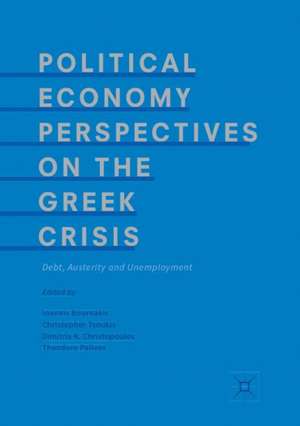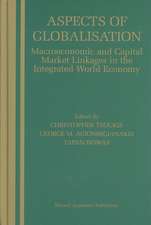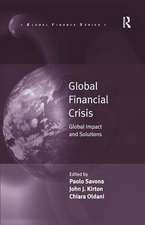Political Economy Perspectives on the Greek Crisis: Debt, Austerity and Unemployment
Editat de Ioannis Bournakis, Christopher Tsoukis, Dimitris K. Christopoulos, Theodore Palivosen Limba Engleză Paperback – 31 aug 2018
This book offers a comprehensive guide to the on-going Greek debt crisis. It identifies and explains Greece’s idiosyncratic weaknesses, and highlights the existing rigidities in the EU architecture that make the recovery prospects of the Greek economy challenging.
Chapters from expert contributors highlight aspects of the performance of the Greek economy with focus on export performance, labour market conditions, political cycles and regional income disparities. The book then goes on to outline the banking system in Greece in the post-crisis era, and includes analysis that explains how the credit rating score affected Greece’s borrowing capacity prior to the start of the insolvency crisis. The final part analyses and compares alternative scenarios of fiscal consolidation, seeking to identify whether there are alternatives to fiscal austerity and the impact of each one of them. This section also clarifies various misconceptions about the significant determinants of international competitiveness. Despite the focus of the book, the lessons drawn from the chapters are not limited to Greece. This volume will be of interest to academics, practitioners and policy makers who wish to take a closer look at the Greek debt crisis and learn more about the challenges the Greek economy is currently facing.
Chapters from expert contributors highlight aspects of the performance of the Greek economy with focus on export performance, labour market conditions, political cycles and regional income disparities. The book then goes on to outline the banking system in Greece in the post-crisis era, and includes analysis that explains how the credit rating score affected Greece’s borrowing capacity prior to the start of the insolvency crisis. The final part analyses and compares alternative scenarios of fiscal consolidation, seeking to identify whether there are alternatives to fiscal austerity and the impact of each one of them. This section also clarifies various misconceptions about the significant determinants of international competitiveness. Despite the focus of the book, the lessons drawn from the chapters are not limited to Greece. This volume will be of interest to academics, practitioners and policy makers who wish to take a closer look at the Greek debt crisis and learn more about the challenges the Greek economy is currently facing.
| Toate formatele și edițiile | Preț | Express |
|---|---|---|
| Paperback (1) | 716.93 lei 6-8 săpt. | |
| Springer International Publishing – 31 aug 2018 | 716.93 lei 6-8 săpt. | |
| Hardback (1) | 989.86 lei 6-8 săpt. | |
| Springer International Publishing – 11 dec 2017 | 989.86 lei 6-8 săpt. |
Preț: 716.93 lei
Preț vechi: 874.30 lei
-18% Nou
Puncte Express: 1075
Preț estimativ în valută:
137.25€ • 141.15$ • 113.86£
137.25€ • 141.15$ • 113.86£
Carte tipărită la comandă
Livrare economică 19 februarie-05 martie
Preluare comenzi: 021 569.72.76
Specificații
ISBN-13: 9783319876184
ISBN-10: 331987618X
Pagini: 388
Ilustrații: XXIV, 388 p. 35 illus.
Dimensiuni: 148 x 210 mm
Greutate: 0.49 kg
Ediția:Softcover reprint of the original 1st ed. 2017
Editura: Springer International Publishing
Colecția Palgrave Macmillan
Locul publicării:Cham, Switzerland
ISBN-10: 331987618X
Pagini: 388
Ilustrații: XXIV, 388 p. 35 illus.
Dimensiuni: 148 x 210 mm
Greutate: 0.49 kg
Ediția:Softcover reprint of the original 1st ed. 2017
Editura: Springer International Publishing
Colecția Palgrave Macmillan
Locul publicării:Cham, Switzerland
Cuprins
Chapter 1: On the political economy of the Greek crisis: Introduction and background.- Chapter 2: The Eurozone crisis: A near-perfect case of mismanagement.- Chapter 3: Structural Reforms in the EU.- Chapter 4: The Responsibility of the EU.- Chapter 5: On the institutional responses to the Euro crisis: Is there a role for ‘German Macroeconomics’?- Chapter 6: Austerity and the Greek Dra(ch)ma: Three economists’s views and a comment.- Chapter 7: A Macroeconomic perspective on the Greek debt crisis.- Chapter 8: On the role of the credit rating agencies in the Euro zone crisis.- Chapter 9: The Greek Great Depression: A General Equilibrium study of its Drivers.- Chapter 10: The limits of austerity: The fiscal multiplier and the ‘Debt Laffer Curve’.- Chapter 11: Fiscal Consolidation Policies and the Underground Economy in Greece.- Chapter 12: Output and Unemployment: Estimating the Okun’s Law for Greece.- Chapter 13: On the Determinants of Non-Performing Loans (NPLs): Lessons from Greece.- Chapter 14: Who Exports High-Quality Manufacturing Products? Some Empirical Regularities from Greek Exporting Firms.- Chapter 15: Spatial Structure and Spatial Dynamics of Regional Incomes in Greece.- Chapter 16: Greece’s Loss of competitiveness: A survey and Concluding Remarks.
Notă biografică
Ioannis Bournakis is Senior Lecturer in Economics at Middlesex University, UK. He has an MSc in Economics and Econometrics from the University of Manchester, UK and a PhD in Economics from the University of Kent, UK. His research interests are in the fields of international trade, economic growth and applied macroeconomics.
Christopher Tsoukis is Senior Lecturer in Economics at Keele University, UK, specialising in macroeconomics. His research interests include behavioural and social macroeconomics, fiscal policy, political economy and the economy of Greece.
Dimitris K. Christopoulos is Professor of Economics at Panteion University in Athens, Greece. Dimitris has a BA in Economics from Athens University of Economics and Business, and a PhD from Panteion University. His main research interests are in the areas of economic growth, economic development, microeconomics and non-linear models.
Theodore Palivos is Professor of Economics at Athens University of Economics and Business and Senior Fellow at the Rimini Center for Economic Analysis. He has a PhD from Penn State University, US. His current research interests are in the areas of labour economics, macroeconomics, and public economics.
Christopher Tsoukis is Senior Lecturer in Economics at Keele University, UK, specialising in macroeconomics. His research interests include behavioural and social macroeconomics, fiscal policy, political economy and the economy of Greece.
Dimitris K. Christopoulos is Professor of Economics at Panteion University in Athens, Greece. Dimitris has a BA in Economics from Athens University of Economics and Business, and a PhD from Panteion University. His main research interests are in the areas of economic growth, economic development, microeconomics and non-linear models.
Theodore Palivos is Professor of Economics at Athens University of Economics and Business and Senior Fellow at the Rimini Center for Economic Analysis. He has a PhD from Penn State University, US. His current research interests are in the areas of labour economics, macroeconomics, and public economics.
Textul de pe ultima copertă
This book offers a comprehensive guide to the on-going Greek debt crisis. It identifies and explains Greece’s idiosyncratic weaknesses, and highlights the existing rigidities in the EU architecture that make the recovery prospects of the Greek economy challenging.Chapters from expert contributors highlight aspects of the performance of the Greek economy with focus on export performance, labour market conditions, political cycles and regional income disparities. The book then goes on to outline the banking system in Greece in the post-crisis era, and includes analysis that explains how the credit rating score affected Greece’s borrowing capacity prior to the start of the insolvency crisis. The final part analyses and compares alternative scenarios of fiscal consolidation, seeking to identify whether there are alternatives to fiscal austerity and the impact of each one of them. This section also clarifies various misconceptions about the significant determinants of internationalcompetitiveness. Despite the focus of the book, the lessons drawn from the chapters are not limited to Greece.
This volume will be of interest to academics, practitioners and policy makers who wish to take a closer look at the Greek debt crisis and learn more about the challenges the Greek economy is currently facing.
Ioannis Bournakis is Senior Lecturer in Economics at Middlesex University, UK. He has an MSc in Economics and Econometrics from the University of Manchester, UK and a PhD in Economics from the University of Kent, UK. His research interests are in the fields of international trade, economic growth and applied macroeconomics.
Christopher Tsoukis is Senior Lecturer in Economics at Keele University, UK, specialising in macroeconomics. His research interests include behavioural and social macroeconomics, fiscal policy, political economy and the economy of Greece.
Dimitris K. Christopoulos is Professor of Economics at Panteion University in Athens, Greece. Dimitris has a BA in Economics from Athens University of Economics and Business, and a PhD from Panteion University. His main research interests are in the areas of economic growth, economic development, microeconomics and non-linear models.
Theodore Palivos is Professor of Economics at Athens University of Economics and Business and Senior Fellow at the Rimini Center for Economic Analysis. He has a PhD from Penn State University, US. His current research interests are in the areas of labour economics, macroeconomics, and public economics.
Ioannis Bournakis is Senior Lecturer in Economics at Middlesex University, UK. He has an MSc in Economics and Econometrics from the University of Manchester, UK and a PhD in Economics from the University of Kent, UK. His research interests are in the fields of international trade, economic growth and applied macroeconomics.
Christopher Tsoukis is Senior Lecturer in Economics at Keele University, UK, specialising in macroeconomics. His research interests include behavioural and social macroeconomics, fiscal policy, political economy and the economy of Greece.
Dimitris K. Christopoulos is Professor of Economics at Panteion University in Athens, Greece. Dimitris has a BA in Economics from Athens University of Economics and Business, and a PhD from Panteion University. His main research interests are in the areas of economic growth, economic development, microeconomics and non-linear models.
Theodore Palivos is Professor of Economics at Athens University of Economics and Business and Senior Fellow at the Rimini Center for Economic Analysis. He has a PhD from Penn State University, US. His current research interests are in the areas of labour economics, macroeconomics, and public economics.
Caracteristici
Offers an economic explanation to the failures of both the Greek economy as well as systemic failures of the euro architecture and the operations of EU authorities Brings together contributions from economists with a wide range of expertise Contributes to the on-going public debate about the sources of failure of other peripheral EU countries in providing economic prosperity since 2008 Provides a balance of theoretical argument, empirical evidence, and a range of perspectives on the Greek case Includes supplementary material: sn.pub/extras














